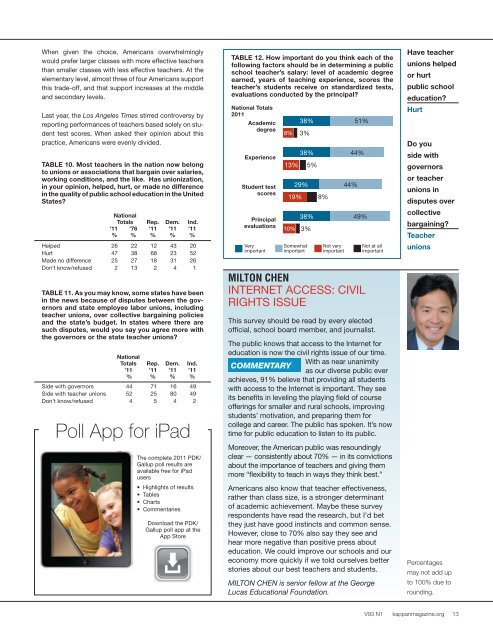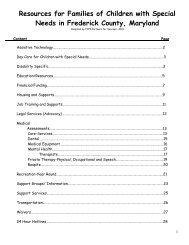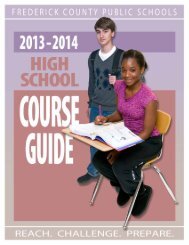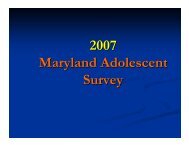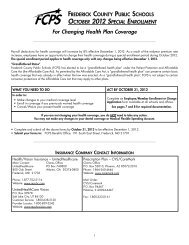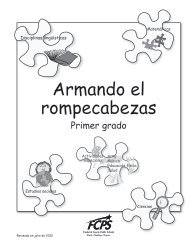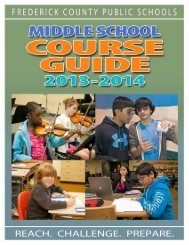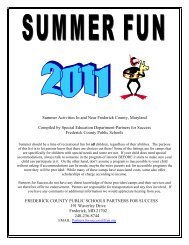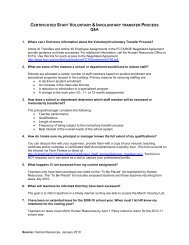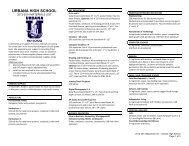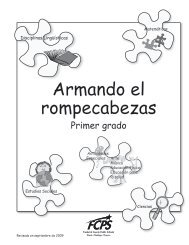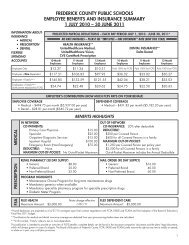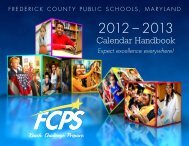43rd annual Phi Delta Kappa/Gallup Poll
43rd annual Phi Delta Kappa/Gallup Poll
43rd annual Phi Delta Kappa/Gallup Poll
You also want an ePaper? Increase the reach of your titles
YUMPU automatically turns print PDFs into web optimized ePapers that Google loves.
When given the choice, Americans overwhelmingly<br />
would prefer larger classes with more effective teachers<br />
than smaller classes with less effective teachers. At the<br />
elementary level, almost three of four Americans support<br />
this trade-off, and that support increases at the middle<br />
and secondary levels.<br />
Last year, the Los Angeles Times stirred controversy by<br />
reporting performances of teachers based solely on student<br />
test scores. When asked their opinion about this<br />
practice, Americans were evenly divided.<br />
TABLE 10. Most teachers in the nation now belong<br />
to unions or associations that bargain over salaries,<br />
working conditions, and the like. Has unionization,<br />
in your opinion, helped, hurt, or made no difference<br />
in the quality of public school education in the United<br />
States?<br />
National<br />
Totals Rep. Dem. Ind.<br />
’11 ’76 ’11 ’11 ’11<br />
% % % % %<br />
Helped 26 22 12 43 20<br />
Hurt 47 38 68 23 52<br />
Made no difference 25 27 18 31 26<br />
Don’t know/refused 2 13 2 4 1<br />
TABLE 11. As you may know, some states have been<br />
in the news because of disputes between the governors<br />
and state employee labor unions, including<br />
teacher unions, over collective bargaining policies<br />
and the state’s budget. In states where there are<br />
such disputes, would you say you agree more with<br />
the governors or the state teacher unions?<br />
National<br />
Totals Rep. Dem. Ind.<br />
’11 ’11 ’11 ’11<br />
% % % %<br />
Side with governors 44 71 16 49<br />
Side with teacher unions 52 25 80 49<br />
Don’t know/refused 4 5 4 2<br />
<strong>Poll</strong> App for iPad<br />
The complete 2011 PDK/<br />
<strong>Gallup</strong> poll results are<br />
available free for iPad<br />
users<br />
• Highlights of results<br />
• Tables<br />
• Charts<br />
• Commentaries<br />
Download the PDK/<br />
<strong>Gallup</strong> poll app at the<br />
App Store<br />
TABLE 12. How important do you think each of the<br />
following factors should be in determining a public<br />
school teacher’s salary: level of academic degree<br />
earned, years of teaching experience, scores the<br />
teacher’s students receive on standardized tests,<br />
evaluations conducted by the principal?<br />
National Totals<br />
2011<br />
Academic<br />
degree<br />
Experience<br />
Student test<br />
scores<br />
Principal<br />
evaluations<br />
8%<br />
13%<br />
38%<br />
29%<br />
19%<br />
10%<br />
3%<br />
38%<br />
38%<br />
3%<br />
5%<br />
8%<br />
51%<br />
44%<br />
44%<br />
49%<br />
Very Somewhat Not very Not at all<br />
important important important important<br />
MILTON CHEN<br />
INTERNET ACCESS: CIVIL<br />
RIGHTS ISSUE<br />
This survey should be read by every elected<br />
official, school board member, and journalist.<br />
The public knows that access to the Internet for<br />
education is now the civil rights issue of our time.<br />
COMMENTARY<br />
With as near unanimity<br />
as our diverse public ever<br />
achieves, 91% believe that providing all students<br />
with access to the Internet is important. They see<br />
its benefits in leveling the playing field of course<br />
offerings for smaller and rural schools, improving<br />
students’ motivation, and preparing them for<br />
college and career. The public has spoken. It’s now<br />
time for public education to listen to its public.<br />
Moreover, the American public was resoundingly<br />
clear — consistently about 70% — in its convictions<br />
about the importance of teachers and giving them<br />
more “flexibility to teach in ways they think best.”<br />
Americans also know that teacher effectiveness,<br />
rather than class size, is a stronger determinant<br />
of academic achievement. Maybe these survey<br />
respondents have read the research, but I’d bet<br />
they just have good instincts and common sense.<br />
However, close to 70% also say they see and<br />
hear more negative than positive press about<br />
education. We could improve our schools and our<br />
economy more quickly if we told ourselves better<br />
stories about our best teachers and students.<br />
MILTON CHEN is senior fellow at the George<br />
Lucas Educational Foundation.<br />
Have teacher<br />
unions helped<br />
or hurt<br />
public school<br />
education?<br />
Hurt<br />
Do you<br />
side with<br />
governors<br />
or teacher<br />
unions in<br />
disputes over<br />
collective<br />
bargaining?<br />
Teacher<br />
unions<br />
Percentages<br />
may not add up<br />
to 100% due to<br />
rounding.<br />
V93 N1 kappanmagazine.org 13


